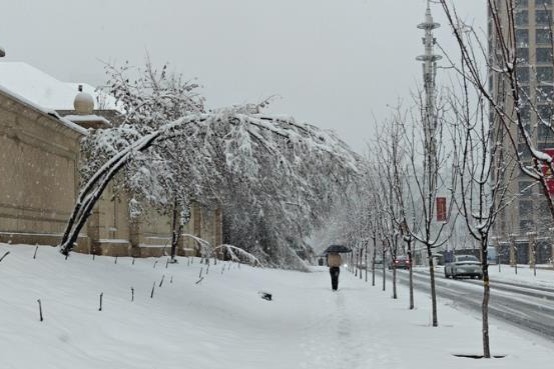Nanjing Massacre memorial hall marks Japan's WWII surrender

NANJING - The Memorial Hall of the Victims in Nanjing Massacre by Japanese Invaders held a memorial event on Thursday morning to mark the 79th anniversary of Japan's surrender in World War II (WWII).
On Aug 15, 1945, the Chinese people's 14-year arduous fight against the invaders ended as Japan announced its unconditional surrender.
Approximately 30 people, including school children, college volunteers and the descendants of Nanjing Massacre survivors attended the event held at an exhibition hall that features a reenacted scene of a surrender signing ceremony held in Nanjing back in 1945.
Attendees watched a short film titled "Countdown to Surrender" at the event.
A curved wall made of beige sandstone stands at the exhibition hall, on which 648 handprints in bright red color are featured. The owners of these handprints share a common name -- veterans of the Chinese People's War of Resistance against Japanese Aggression.
"This is the handprint of late veteran Zhang Yuhua, whose right hand was pierced by a bullet during the war," said Zhang Ruochu, a second-grader in Nanjing, capital city of east China's Jiangsu Province, telling the story behind these veterans' handprints to attendees.
Xia Shuqin is a survivor of the Nanjing Massacre. On Thursday morning, her granddaughter, Xia Yuan, and great-grandson, Li Yuhan, also attended the event. In 2022, Xia and Li were recognized as inheritors of historical memories regarding the Nanjing Massacre.
The Nanjing Massacre took place when Japanese troops captured the then Chinese capital on Dec 13, 1937. Over six weeks, they killed approximately 300,000 Chinese civilians and unarmed soldiers in one of the most barbaric episodes of WWII. Today, there are only 32 living registered survivors of the massacre.
The 14-year-old Li Yuhan, the youngest among the inheritors, has served as a guide at the Memorial Hall of the Victims in Nanjing Massacre by Japanese Invaders for several years.
Xia said that as her grandmother ages and her hearing and sight deteriorates, she hopes they will be able to give a testimony on her behalf, allowing more people to learn about this historical event.
Outside the memorial hall, visitors formed long lines. "This is not only the pain of Nanjing but also the memory of our nation. We will remember history and cherish our current peaceful lives even more," said one visitor.
In the lead-up to the anniversary of Japan's surrender, Japanese veteran Hideo Shimizu, 94, visited the former headquarters of Unit 731 and the Exhibition Hall of Evidences of Crime Committed by Unit 731 of the Japanese Imperial Army in the northeastern Chinese city of Harbin.
On Thursday, Shimizu wrapped up his four-day expiatory visit. "This may be my last chance to come to China to express my apologies," said Shimizu. During the visit, Shimizu recounted to the museum curator and the others what he saw during his military service.
The former member of the Unit 731 Youth Corps fled China with the retreating Japanese forces on Aug 14, 1945.
- Senior Xi'an official facing probe by China's anti-corruption watchdogs
- Philippines risks creating trouble for itself: China's defense ministry
- Newborn with congenital heart disease receives life-saving surgery in Yunnan
- Hong Kong charity signs diplomatic talent deal with Beijing university
- Aircraft carrier Fujian, commissioned
- Erdos offers 10,000 yuan subsidy for families having third child



































